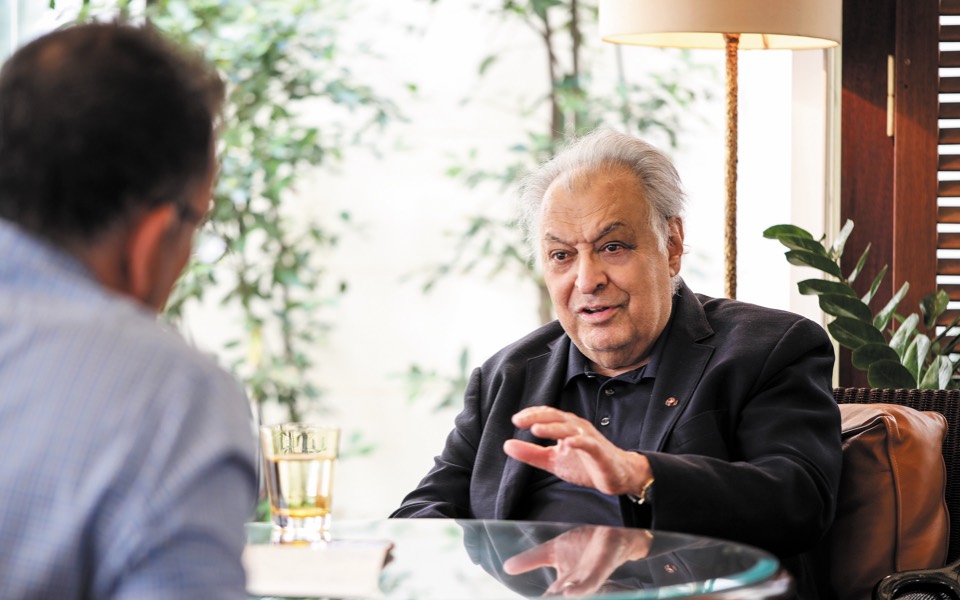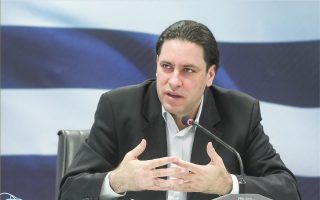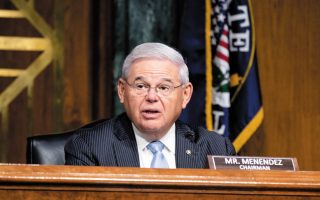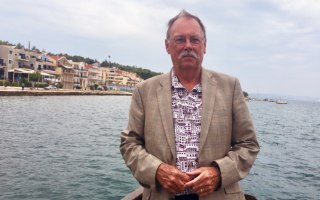‘Music is my language,’ says legendary conductor

It was raining when we met on the morning of June 14. The organizers of the event – the Athens Concert Hall (familiarly known as the Megaron) and the Athens Epidaurus Festival – were anxious: Later that evening, Zubin Mehta, was to conduct the Orchestra del Maggio Musicale Fiorentino, with violin soloist Pinchas Zukerman, to celebrate the Megaron’s 30 years of service. This would be the first time the Megaron has participated in the Athens Epidaurus Festival with a concert of classical music.
They were right to be anxious. Only the first half of the planned concert was performed. The rain quickly intensified.
A few hours before the concert, 84-year-old Zubin Mehta was not so much concerned about the stormy weather as about the sound he would be producing for the audience. Sitting opposite me, holding his walking stick and looking a bit haggard from the cancer that afflicted him three years ago, he said he was troubled by the Covid restrictions. “Because of this we could not bring our whole orchestra to Athens. We had to keep a 2-meter safe distance between musicians. For example, we could only bring 12 violinists instead of 16. As a result, the sound we are about to present is not the sound I know this orchestra can produce. But we shall do our best.”
It is somewhat weird to have a living legend sitting across from you, worrying about the sound he is going to produce, as if he were a novice musician.
If there is something that has kept this great man strong and vigorous, it is his passion for music, for conducting, for musical interpretation. This enthusiasm has not faded in the least since he began his career.
It is a known fact that Mehta grew up in a house filled with music. Both his parents were involved in music; his father was a violinist and founder of the Bombay Symphony Orchestra.
“I saw my father rehearse his conducting, saw him study the violin and, every once in a while, bring a string quartet to perform at our house. Music was my language before I even knew myself.”
His parents, however, wanted him to be a doctor. “We belong to the Parsi minority,” he explains. “That is 80,000 people worldwide, among 1.3 billion Hindus. The Parsis, who love Western culture, could not ever be butchers or farmers. They were becoming architects, lawyers, doctors. So I was going to be a doctor. I went to university to study pre-med. But I never went to medical school.”
In 1954, Mehta, aged 18, went to Vienna to study music. I listen to him in awe. What did it mean to be in Vienna to become a musician in 1954? I let him explain. “It was the absolute musical center of Europe. People did not travel much in those days, there were no concerts. So all the great conductors were there, as were all the great opera performers. There were Herbert von Karajan and Elisabeth Schwarzkopf and others, and every single night I was at a concert or at the opera. I stood and listened. Sometimes I went to the Vienna Philharmonic’s rehearsals. I was studying the contrabass. My teacher, a bass soloist, took me along to rehearsals. I witnessed the greatest musicians at work, and I heard the sound they were producing. Mitropoulos, for example. I learned a lot from Dimitri Mitropoulos. I saw him conduct from up close. I was on stage and watched him rehearse. We got to know each other a little. You know, these days I’m doing Verdi’s ‘La forza del destino’ and I am still using the score he gave me back in Vienna.”
Then, he stops. “Tell me something,” he asks earnestly. “Is there a music room in Athens that bears his name?” I tell him that there is the Dimitris Mitropoulos Hall at the Megaron. He seems satisfied. “To me he is the greatest Greek musician,” he says. “He was a phenomenon. One night I would see him conduct Verdi’s ‘Un ballo in maschera,’ and the next Richard Strauss’ ‘Elektra,’ and all that from memory. He never used a score.”
“It was Mitropoulos who first conducted Gustav Mahler’s Third Symphony at the Vienna Philharmonic,” he adds. “And no one at the Vienna Philharmonic knew the work! Mahler was banned by the Nazis, because he was a Jew. The ban remained in place until well after the war. A sad tradition. Same with Mendelssohn. No one knew his famous Violin Concerto. In general, the great conductors of the time seldomly noticed these composers. Karajan and Behm never conducted works by Mahler.”
Mehta remembered these injustices when, as director of the New York Philharmonic, he did something groundbreaking in Harlem, in 1978. “I realized that the Philharmonic had never performed in Harlem. So I spoke to the man in charge of the Abyssinian Baptist Church. He was a great admirer of music and a progressive. I told him we wanted to go and play music there. He told me we were very welcome. Leontyne Price soon found out and she told me: ‘You can’t do this concert without me! I was married in that church!’ Many people came, beautifully dressed. The next day a newspaper had us on the front page with the title ‘Take the A Train,’ a reference to the Duke Ellington song and the train that reaches Harlem. In the end, wrote the paper, the New York Philharmonic finally took the A Train.”
Another of Mehta’s weird moments was the performance of “Turandot” at the Forbidden City in Beijing. “I was collaborating with Zhang Yimou, who had directed a marvelous production of ‘Turandot’ in Florence. The costumes were all handwoven in Shanghai. But Zhang was not very popular at home. The authorities did not consider him a patriot. I went there in 1996 with the Vienna Philharmonic to persuade them to let us do this production with Zhang. I took a box of Indian mangoes to the minister. To them this is a holy place, and when Bertolucci filmed ‘The Last Emperor,’ the crew had broken all sorts of things. We covered and protected everything for rehearsals. We revealed them only in the premiere. We didn’t break anything,” he giggles.





